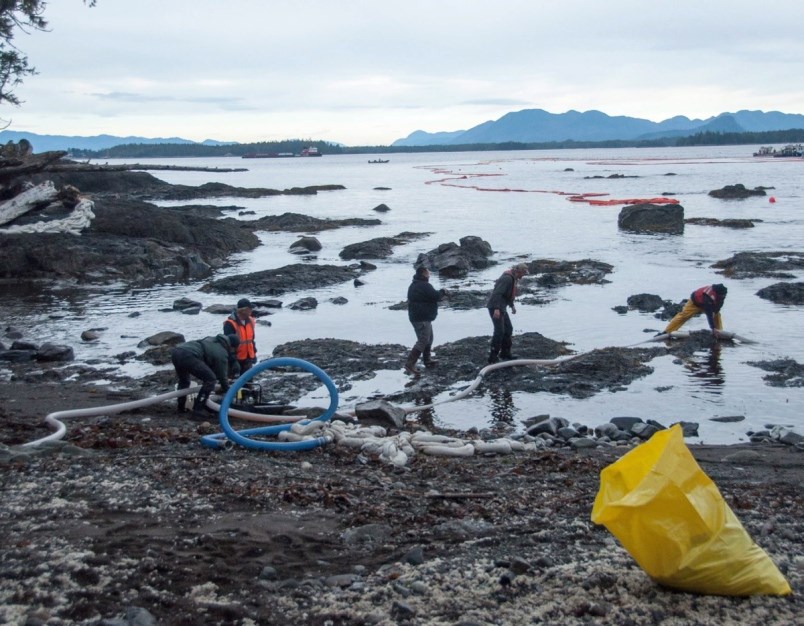The increasingly dogmatic, even threatening, rhetoric directed against B.C. by both Alberta and Ottawa has reached a particularly sour stage. Perhaps it is time to end the “marriage.”
Why the threats? B.C.’s NDP government had sought further assurance in a scientific evaluation that diluted bitumen, such as that to be transported by the Kinder Morgan pipeline, can be cleaned up in the event of a spill. Given that a future spill is almost a statistical certainty, the position of B.C. seemed a simple case of due diligence, since the consequence of a major pipeline spill would have dramatic and long-lasting impacts on many British Columbians.
The angry threats of a trade war coming from Alberta and the frank bullying by Ottawa brought to mind victimization in an abusive relationship. The standard, and correct, advice to the victim is to leave, or at the very least seek urgent counselling. When the counselling is mediated by one of the abusers, however, leaving is the only safe option.
A confederation, such as Canada’s, is much like a marriage. Ideally, it is entered into voluntarily, contains a variety of safeguards, is mutually beneficial and, not least, has the escape clause of divorce if the relationship cannot be made to work.
Most authoritarian states do not allow for the separation of disgruntled regions, which might or might not have joined the nation voluntarily. Cases include the Kurdish region in northern Iraq and even in democratic Spain with its restive Catalonia.
Canada has always been a voluntary confederation for the settler populations of the provinces, and, over our history, some of these have contemplated leaving. Quebec comes first, with two referenda on the issue in the past. Nova Scotia, Newfoundland, B.C. and, ironically, Alberta, have had independence movements of various scales.
Quebec came closest to seceding, but time and circumstances, as well as some long-overdue respect from the rest of Canada, led a slim majority of Quebecers to conclude that they were better off remaining. The Clarity Act passed into law after 1995 put much-needed guidelines on the process of separation should the matter arise for any province in the future.
In Quebec’s case, the dominant issues were Québécois’ historical national identity and achieving greater autonomy within Confederation. In B.C. in 2018, the circumstances are different. Our identity as a society is not in particular jeopardy, but our health and well-being might well be.
Alberta thinks it completely reasonable from a fairly narrow economic perspective to force on us something many British Columbians think is dangerous, which has the real capacity to do us enormous harm. Ottawa, locked into support for a dying fossil-fuel industry, has blatantly taken Alberta’s side.
In such a case, when economic benefits for some appear to override safety for others, what are those “others” to conclude? The only answer, as in a marriage, is to seek a way out, given the growing sense that however much confederation might have worked for B.C. in the past, it might no longer do so. Insofar as this might be true, perhaps it is time to shake hands with the rest of Canada and leave.
As with any divorce, there would be numerous issues to resolve. How are joint assets or debts to be divided? How does the rest of Canada gain access to the Pacific and how to we do trade eastward? What would happen to our relationship to the United States? Also, how would an independent B.C. relate to First Nations social and political aspirations?
If one were to say that Canada is divisible when the union no longer works, then the same right of self-determination has to be afforded to First Nations and to regions of B.C. that might not want to leave Confederation, or that might want some other form of relationship with B.C. and/or the rest of Canada.
In a divorce, the same things come up: Who gets the house, what about child custody, who gets the family dog, and how do both ex-partners relate to other family members and mutual friends?
Sometimes, such issues are solved amicably, sometimes not, but solved they eventually are, and life goes on.
Divorcing from Canada would be neither easy nor painless, and it would be foolish to pretend otherwise. But it is far better to have the frank conversation now that this could be in the cards, particularly if B.C.’s Confederation partners fail to realize that this time some of them have gone too far.
Christopher A. Shaw is a professor of ophthalmology at the University of British Columbia.



